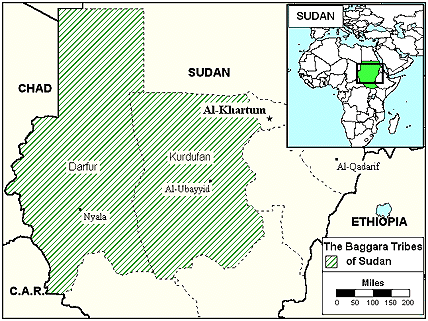The many Baggara tribes of northern Sudan share many cultural characteristics and claim a common ancestry. All of them speak an Arabic dialect known as Baggari, that both Arabic and Sudanese Arabic speakers can understand. Their name comes from the Arabic word bagar, which means "cow," and refers to the various Arab tribes in Sudan (and surrounding nations), who herd cattle. We call one of these tribes the Dubasiyin.
The Dubasiyin tribe lives in the plains of Sudan's Darfur, North Kordofan, and South Kordofan provinces. The region is well suited for grazing cattle and varies from sparse scrub lands in the northern areas to arid and semi-arid wilderness lands to wooded fields. It only rains from June to September. They struggle when the rains don't come; no rain means no grass for their cattle.
The Baggara have traced their origin back several centuries to the days before Mohammed. They claim to be connected to the Juhayna of the Hejaz, a region of northwestern Saudi Arabia. Over the centuries, they have become widely scattered across the plains of north central Africa.
Most of the Dubasiyin are herdsmen. They raise cattle, although some also raise sheep and goats. They keep camels for riding and as pack animals.
The nomadic Dubasiyin live in camp units called furgan. Members of the furgan belong to one or more family line. The Dubasiyin live in simple, dome-shaped tents, which are portable structures that can be easily packed and moved with the herds. They build their tents by placing saplings into holes in the ground, then bending them over and tying them at the top. They tie smaller branches into the frame, then cover them with thatch or canvas mats. They arrange their tents in a circle where they keep the cattle at night.
Although most Dubasiyin tribes are nomadic, there are some that live in farming communities or towns. They build their houses of mud bricks with thatched roofs. Each compound has a corral for the young livestock. They share grazing land, but individual families own farmland.
Dubasiyin women work to provide the income needed to maintain the households. They earn cash by milking the cows and selling the milk or milk products. They either keep their earnings or spend it on household items. A married woman owns the tent and all of its housekeeping contents. The men stay busy tending the herds. Men also plant and harvest the crops.
Dubasiyin marriages are often polygamous. If a man has two wives, one may live in a pastoral camp while the other lives in a farming village. They prefer cross-cousin marriages. The future husband and his near relatives provide a bride price. After the wedding, the newlyweds live near the bride's parents. Later, they move to a place chosen by the husband. On this occasion, the groom's family provides another feast.
Dubasiyin society is patrilineal, so they trace the line of descent through the males. Traditionally, each camp was headed by a male leader called shaykh. Although someone inherits this position, all the adult male members of a camp must agree on the man who is to fill the position. The shaykh does not rule the camp but acts as the spokesperson for the decision-making males of the camp. However, he may also have a considerable amount of influence, depending on his wisdom and economic status.
The Baggara tribes are almost completely Muslim. Eight of the groups are Sunnis, while the others belong to the Malikite sect, which is stricter. All of them faithfully observe the "five pillars of Islam." Many of the men and some women can make pilgrimages to Mecca.
The Dubasiyin hold various religious celebrations, some of which are about life stages. These often have a pre-Islamic origin.
There has been very little evangelization among Dubasiyin tribe. The people devote themselves to the Islamic religious system. They will not consider following Jesus Christ. Their nomadic lifestyle makes it difficult for missionaries to reach them. It will take faithful prayer and loving, long-term workers to take Christ's blessings to the Dubasiyins and other Baggara tribes.
Pray for African believers to have hearts that are willing to take Jesus to the Dubasiyin people.
Pray for the Dubasiyin people to have hearts that are open to the abundant blessings of Jesus Christ.
Pray for their families to prosper financially and spiritually as they experience a relationship with Jesus Christ.
Pray for a movement to Christ among the Dubasiyin that will spread joy, peace, and salvation to other peoples in East Africa.
Scripture Prayers for the Dubasiyin in Sudan.
https://en.wikipedia.org/wiki/Dubasiyin_people
https://www.tripmondo.com/sudan/khartoum-state/dubasiyin/
| Profile Source: Joshua Project |











